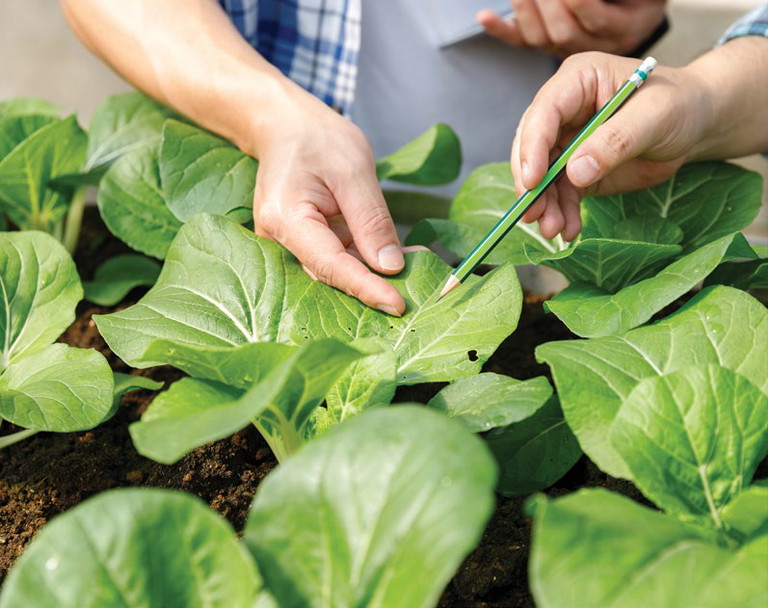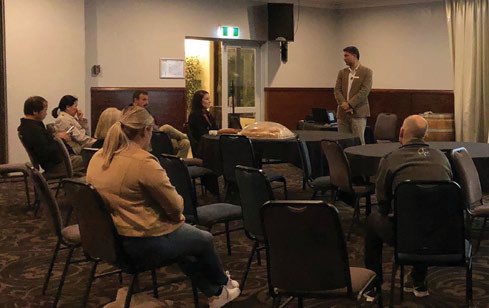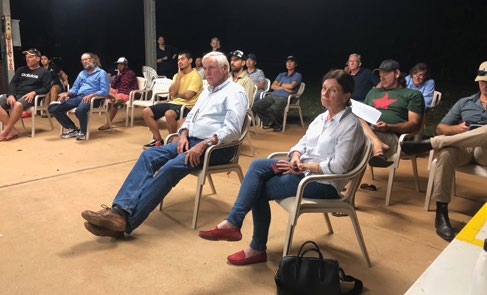FARM BIOSECURITY FOCUS
BY TRUYEN VO REGIONAL DEVELOPMENT OFFICER, VEGETABLESWA


THE aim of the project is that at least 10 per cent of WA vegetable growers will have farm biosecurity plans developed and implemented by the end of the project.
Developing and implementing farm biosecurity plans.
Are VegNET WA Regional Development Officers and WA vegetable growers on the same page?
In December 2020, a project was established to improve the capacity of Western Australian growers to develop and implement farm biosecurity and plant protection management plans.
The project is part of the National Vegetable Extension Network (VegNET) project, funded by Hort Innovation Australia (HIA).
The aim of this project is to:
1 Assist with information dissemination, from national and state sources, regarding on-farm compliance; as well as cultivating positive cultural attitudes among vegetable growers, and
2 To consolidate the state’s defence against new and unpredictable biosecurity threats. The project also aims to strengthen vegetable growers’ capacity to develop and implement farm biosecurity plans that enhance their business sustainability.
VegNET WA Regional Development Officers contributions
Planning
This project is the result of a careful screening process to capture the key insights regarding the importance of WA vegetable production, available knowledge of farm biosecurity practices, the known opportunities for improvement in grower’s practices in this area and the benefits of bridging the gaps.
RDOs have designed the project strategy in a way that will help grower participants to move through a five-stage process of innovation adoption. The five steps are:
1. Knowledge — expose growers to farm biosecurity concepts and assist them with understanding the benefits.
2. Persuasion — the forming of a favourable attitude towards innovation.
3. Decision — commitment to its adoption.
4. Implementation —putting it to use.
5. Confirmation —reinforcement based on positive outcomes from it.
Implementing project activities
A multi-agency task force was established in February 2021 to share knowledge and resources to assist growers with enhancing farm biosecurity practices.
The task force includes Department of Primary Industries and Regional Development WA (DPIRD) plant pathologists and entomologists, AUSVEG biosecurity coordinators, a Perth Natural Resources Management (Perth NRM) senior officer and VegNET WA RDOs.
In March 2021, workshops were organised in two major vegetable production areas of WA, Wanneroo and Carnarvon, to introduce growers to the relevant knowledge and information.
The recent incursions of fall armyworm and Queensland fruit fly (Qfly) in WA were used to illustrate the fundamental importance of biosecurity to the horticulture industry.
The presentations covered pest and disease management, as well as the results of the DPIRD area wide management project, which is being used for the control of plant bacteria and virus diseases.
The venues and timing of the workshops were selected to make it easier for growers to participate.
The late afternoon start time was chosen to avoid peak work times and training venues were selected close to the production areas to save growers travel time.
Invitation adverts were prepared in both English and Vietnamese and a range of different communication channels were used to reach growers, such as emailnewsletters and social media (grower communities Facebook pages). Text message reminders were sent to growers on the morning of the workshops.
Refreshments were provided in the breaks to cater to growers who may have come straight to the workshop from their farms.
Translation was provided at the workshops for Vietnamese grower participants.
The presentations were prepared using simple and grower-familiar language, with lot of illustrative images to promote better information uptake.
Frequent breaks at the end of presentations were provided to allow growers time to ask questions and to enable them to absorb key take-home messages.
A multi-agency task force was established in February 2021 to share knowledge and resources.
Grower participation
Attendance at the workshops was pleasing with eight grower participants at Wanneroo and 18 in Carnarvon.
These figures represent approximately 8 and 15 per cent of the total number of vegetable growers in each area, respectively.
A few other growers sent their apologies to RDOs saying that unfortunately they were too busy to attend, but indicated they would attend future workshops.
The growers’ feedback was collected by RDOs using faceto-face discussion and follow up phone calls.
The feedback demonstrated that participants had benefited from attending by gaining good information about farm biosecurity and pests and diseases management.
The higher participation rate in Carnarvon was because fall army worm and Qfly are serious problems in the area.


FARM biosecurity workshop in Carnarvon.
Grower engagement improvement
The grower participation in the two workshops were lower than expected. In future, consideration will be given to how to make the workshops more attractive to growers including:
• Ensuring that the information and techniques that are presented are tailored to growers needs and interests, and
• The delivery format of the workshops to better accommodate grower learning styles.
The project team consider that grower engagement and participation is crucial to the project’s success. The aim of the project is that 10 per cent of WA vegetable growers (approximately 90 growers) will have individual farm biosecurity plans developed and implemented by the end of the project.
RDOs and project collaborators would appreciate more grower feedback and suggestions.
MORE INFORMATION